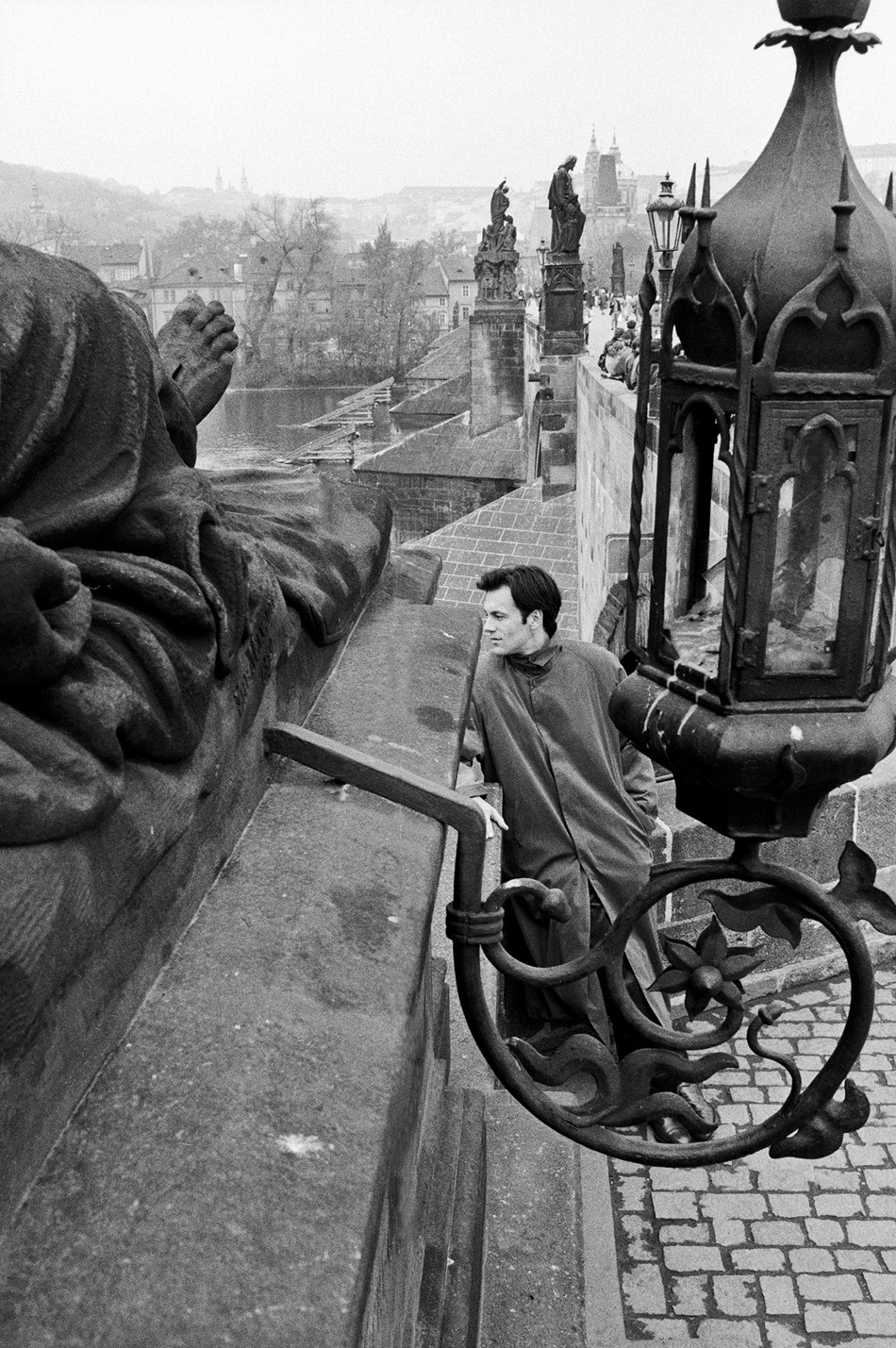One of the rarer pleasures that comes with reviewing works of fiction is happily losing one’s place, falling inadvertently into reading for personal pleasure and not as a proxy for potential readers. That’s what happened to me as I got into Caleb Crain’s debut novel, Necessary Errors—a bildungsroman, very well put together, polished, dry but tender, ferociously observed.
The author is a scholar and a prolific essayist and reviewer. His book American Sympathy (2001), a study of male friendship and authorship in eighteenth- and nineteenth-century America, is frequently taught in American Studies courses. Intense research distinguishes Crain’s journalism. He has a blog called Steamboats Are Ruining Everything, which has won awards and has many readers. A younger version of the hero of Necessary Errors appears in the novella “Sweet Grafton,” published in the December 2007 issue of n+1.
Necessary Errors is the straightforward coming-of-age story of Jacob Putnam. He is a gay man, a recent graduate of Harvard, an English major with aspirations to write, who is teaching English as a second language on contract in Prague just after the triumph of the Velvet Revolution. Jacob’s situation represents a slight twist of the Stendhalian model of the young man from the provinces making his way in the metropolis: Prague is provincial (though exotic in its own way) compared to Cambridge. Jacob is part of a group of young expatriates (Brits, Scots, Irish, other Americans) similarly employed, transitionally bohemian. He is in the foreground of a group portrait of new friends that develops richly over the course of a year.
We know Jacob’s full name, but it’s first names only for the other members of the circle of friends. Evenings with the group
were a holiday from his [Jacob’s] project of understanding the Czechs and of eavesdropping on the after echoes of their revolution, and some nights he seemed to forget about his project altogether for a while….
He would probably have forgotten about his project for good if it weren’t for the problem of love. All the Scots were beautiful, especially Thom,…but Jacob was through with the mistake of falling for straight men…. He wasn’t alone in not knowing what to do about love. With the exception of Mel and Rafe, almost no one in the circle had a lover, not for long anyway. It sometimes felt as if, in compensation, they were all falling in love with one another, as a group.
What gives Crain’s novel its appeal and force as a work of art? The question is worth asking, because certain qualities of Necessary Errors stand counter to fashions prevailing in successful contemporary literary fiction. Crain uses the semicolon. The tale-telling is unusually leisurely. The scenes and exchanges of dialogue can run long. Even though the quest for love and sex is at the heart of things, the recounting of physical incidents is decorous, even chaste. The story is nonviolent and antipicaresque. Jacob comes out as gay to his friends one at a time without causing much reaction. The narrative is unwaveringly linear: no flashbacks. There are no epiphanies, no life-altering changes of consciousness. When the friends pair up or split, they do so considerately.
The efforts by some of them to stimulate their own creativity amount to not much. Nobody is reborn as an artist. The great transformation of the Czech Republic taking place all around them is endured as a spectacle rather than embraced as a subject for analysis. The sustained tourism the friends engage in, around Prague, in side trips to Poland and Berlin, is hardly venturesome.
Necessary Errors works. What happens in this novel? Plot seems a coarse term to apply to the sequence of events dramatized here.
Jacob Putnam has certain aims. He wants to find out how best to live with his recently self-acknowledged gayness, how to find love. He intends to be a writer, at some point. He has a mission:
Jacob had arrived in Prague with a project…. He would have said it was a mood, if anyone had asked…. It was a common enough project for an earnest, idealistic young person who was comfortable with only one pleasure, reading, and who had graduated from college in the year of the protest in Tiananmen Square, the breaching of the Berlin Wall, and the Velvet Revolution, so that his first personal experience of adult freedom…seemed echoed by the wider world…. He had a sense that everything in his life up to that point was prelude, which might safely be skipped…, and the recent date of his discovery that he loved men strengthened this feeling; he thought that nothing finally attached him to the world that had formed him, and that this separation was what he had instead of a skill or a legacy; this was his special advantage. Without knowing it, he was looking for people who were heroic, so he could join them.
This program, of course, is elevated and sad, and, given the world, carrying it out promises risk. There is a gay community in Prague. It’s arduous, but Jacob negotiates his way in. His misadventures commence. Someone who seems to be a serious lover turns out to have a sideline as a prostitute. Jacob proceeds in a state of self-induced blankness. It takes work to follow him through his thoughts and conversations, with no help from anything that might be in his journals or letters. “I’m not anything,” he replies once, when he’s asked what he is.
Advertisement
Jacob’s group is fun to watch. Not for surprise or suspense or the reversals of fortune one associates with vigorous plotting. There’s none of that. But the particularities of the group are brilliantly caught—from the recurrent discomfort they feel as putative beneficiaries of the ugly hypercapitalism descending on the Czechs, to the endless and earnest theorizing of the relationships they’re in, to the minutiae of their presentations of self. Melinda and Rafe are the only couple among them. The group has found a new cheap pub:
Rafe rarely came, but sometimes Melinda did. They had the sense that she was on loan to them, and her dresses and coats seemed to confirm the impression that she was finer than the settings they had chosen, and so, for the sake of balance and a kind of politeness, she was particularly foul-mouthed in her banter, to show that her enjoyment was genuine—that she, at least, did not think she was slumming.
As lost generations go, this one is affecting, and winsome.
But the author complicates the reader’s understanding of this collective of friends, whose functions, for Jacob, raise some perplexing questions. Here he is in a bar with his friends:
He had become a part of its pattern, together with his friends, or perhaps it was the case that he and his friends had imposed a pattern of their own upon the establishment, or at least upon the corner of it that they had taken. He wondered if this feeling was what had come to take the place of what he had once been seeking. The feeling that they were exceptional together. It was their being together that was exceptional, rather than anything any of them did or might do. It wasn’t necessary for anyone outside their group to recognize it; they were in that way independent.
He knew that the feeling wasn’t rational. He didn’t care. He was going to believe in it anyway.
This is the group becoming, for Jacob, both a sacred object and a distraction. His insight here is helped along by alcohol, of course, and this is not the only conversation among the friends in which Crain demonstrates his touch with dialogue addled and inflated by drinking.
Necessary Errors is a political novel. Get far enough away from the grand opera playing in Prague and the performance going on might with some justice be analyzed as an undeclared contest of disparate utopias, consuming utopias, that are working themselves out through the lives of mostly apolitical people. The stage set is the smoking ruin of a socialist dystopia, a ruin whose fumes are strong enough to generate passionate nostalgia in a few of the characters. The replacement, the new Czech branch of the World Capitalist Republic, is achieving a brutal success. Only the friends are a utopia, of a kind—devoted to mutual support, crash pad services, companionship in eating, drinking, and dancing, visiting any one of them who falls sick.
Over time, at least for Jacob, the group begins to function almost as an opiate. He wants to get his act together and to continue his sexual trajectory, which, as he begins, also manifests a distinctly utopian character (he imagines a plausible world of fulfilling sex with no commitment). Utopia is everywhere in this book. There is another utopian stream that surfaces from time to time in Jacob’s management of the world. I don’t know what to call it, but it is a kind of Taoist nonthinking that he appears to rely on to bring him to productive life decisions.
This novel probes deeply in an unexpectedly playful manner into some fundamental matters: love, friendship, solidarity, vocation, the pursuit of truth. Crain writes with skill and grace, and with restraint. Masters of the Flaubertian sentence can exhilarate the reader with lyric images and similes, but always at the risk of betraying self-conscious striving. Crain avoids the temptation to show too much. Here’s the first paragraph of the novel:
Advertisement
It was October, and the leaves of the oaks around the language school had turned gold and were batting light into its tall windows. A young Irish woman was seated alone in the teacher’s lounge. She had made herself a cup of tea on the range in the corner, and she was opening a tangerine on a paper napkin, with hungry carelessness.
These lines are typical Crain. They do their work perfectly but inconspicuously.
Necessary Errors fits within the confines of the classic realist novel. (The phrase “old-fashioned,” meant positively, appears in the promotional copy for the book.) Crain is inventive with the forms he chooses. For example, he has found a clever way to capture the “translationary” medium his polyglot characters inhabit: it’s a device that allows seamless real-time representation of dialogue in different languages, without relying on a lot of distracting explanations. He is always alive to the unintended comedy our communications can yield—and not only in juxtapositions between English and Czech speakers, although several episodes of Jacob’s freelance teaching sessions are among the funniest in the book.
Caleb Crain realizes Prague. The representation of sounds, sights, venues feels comprehensive. Occasionally I wanted him to direct more of his descriptive firepower at the characters, but at the same time I understood that my wish conflicted with an aesthetic decision by the author to deal with the friends as a half-knowable entity, with individual descriptions kept minimal. He is not lavish with his descriptions of the hero, either. We may get three or so descriptive words for each of the featured players, not more. Ultimately, I decided that this was just another specimen of Crain’s sly departures from a classical realist perspective. It has the perverse effect of keeping you reading, wanting more…something more…generous!
Book reviewers are not referred to on occasion as “The Cavilry” for nothing. And despite all the foregoing praise for Crain’s craftsmanship, I find I have a cavil. This story is written in the “free indirect style” (i.e., by identified third person). Normally the narrator has access to the present-tense contents of the protagonist’s mind, and that’s it. But Crain’s narrator, in three places, lets slip that he has a kind of special knowledge, that he knows Jacob’s future. It’s not a persistent aspect of the narration. It happens three times only, but each time, it’s a jolt. For me it did something to the ontology of the tale that I didn’t like. Maybe this is nothing.
I’ve so far resisted the temptation to select a bouquet of felicities from the text of Necessary Errors. Here are a few: “He couldn’t tell if she might really be offended underneath the pretending to be.” “His eyes took on the self- consciousness of someone who is delaying a greeting.” “He was a stranger here. He wasn’t known to any of these people. A girl with a bandanna tied across her forehead as a headdress glanced down bashfully under his stare, and then up again to see if he was still looking. All these people were so happy in not knowing him.”
And this is Jacob on art and revolution:
The powerless tried to reach across with their art, he reasoned, but it was in the failure of the attempt that the powerful found their pleasure, which the powerless misunderstood as sympathy. The better the art, the more poignant the failure. The only one who really suffered under the illusion was the artist.
I should add a brief appreciation of Crain’s treatment of politics, world politics. It’s true that the odd times we live in haven’t yet found their reflection in transcendental fictional art. Think of it: the universal secular religion embodied in the socialist project is finished, disgraced; the interim successor, a social democracy hybrid, is decomposing; regnant unchecked neoliberalism appears itself to be in severe crisis.
Crain has told, subtly, the story of a temporary utopia of friends briefly established on the lip of a volcano as socialism exits the scene in the Czech Republic. Except for one character who has elected to work for the victors, Jacob and his friends experience the confounding moment in recognizable variants of the way intelligent, educated people of good will everywhere have done, are doing.
Here is Jacob in an exchange with an embittered Danish leftist named Hans:
Hans smiled falsely. “It is understandable that an American should have trouble with, how should I say it, the idea of ideals. In your country they are hardly a force in public affairs.”
“Oh no, they are,” Jacob said.
“Then you shall tell me the name of the ideal that inspired your country to overthrow Allende, who was democratically elected, and to replace him with Pinochet, a torturer and a murderer. Do you know to what I am referring?”
“Yes, Chile,” Jacob was able to answer, but only because he had once read a novel about the coup. He felt a chill in his stomach and drank more of the sekt, to calm himself. “But it happened without our knowledge.”
“Ah, the American people and their knowledge. Indeed, they were so upset that a few years later their government gave money to death squads in El Salvador, and your military supervised torture in El Salvador’s prisons.”
Was this true? It seemed suspicious to Jacob that he had never heard the question argued before in this way, as if America were culpable rather than inadvertently complicit. He reproached himself for never having cared to find out the facts. It was surprising how tender he was about his country’s honor; he had always thought of himself as merely a critic, but his mouth was now dry with apprehensiveness….
His thinking mind, as he walked, repeated the stages of the argument and struggled to improve his position, looking for new defenses and new points of attack—America’s benevolence to Western Europe and the Third World…. But his deeper mind had fallen still.
We follow these exchanges over power politics and responsibility with sympathy for these confused young people of Crain’s in 1990 Prague. From the vantage point of 2013, the portents in the events of those days as Crain describes them show darkly. Much in Eastern Europe has gone badly. Here is G.M. Tamás, a dissident libertarian philosopher under communism in both Romania and Hungary, summarizing the state of things in a 2013 interview in New Left Review. Speaking of the revolution against Ceau¸sescu, he says:
I don’t for a moment regret having fought against the “socialist” regime—mendacious, stupid, brutal…. But I dislike very much the results of those struggles…. People like Wałesa, Havel, Kuroń and the rest (myself included) presented their ideals as something Western—a synonym of success—to the extent of cheering on the Gulf War. When the measure of the collapse of a civilization was finally taken—while we old dissidents were still celebrating freedom, but already being accused by the new powers-that-be of being rootless-cosmopolitan 68ers, fornicators, gays, Roma-lovers and, worst of all, fe-mi-nists—then it was too late.
While the Czech Republic’s economy is seen as a relative success story among countries of the former Eastern Bloc, corruption there has reached spectacular heights. The most recent scandal, in June, reached the office of the prime minister and culminated in his resignation.
There’s always more to say about a novel like this. I could for example have said more about another theme present in the book, namely Jacob Putnam’s notion of gay sexuality as ideally a game without rules or limits, a sort of utopia of its own.
We’re not through with narratives about the Getting of Wisdom, Americans Abroad, Coming of Age, Gay Coming of Age, New Lost Generations. Among such works, a new narrative will be measured against Caleb Crain’s fine book, which will endure as a powerful entry in the great fictional exploration of the meanings of liberation.





